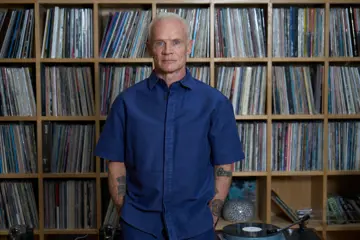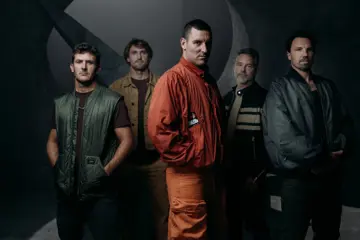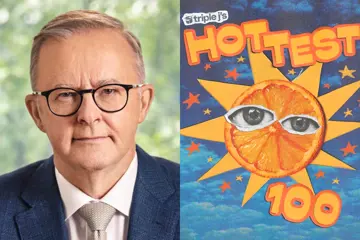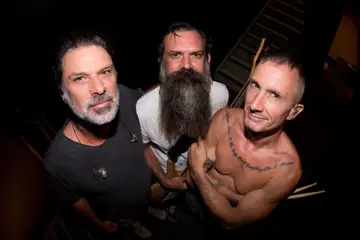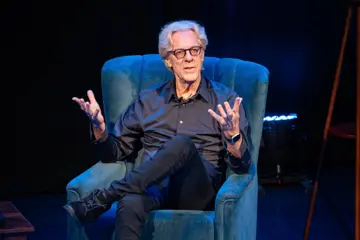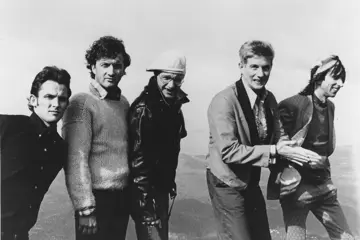To the average cinema-goer, the man gracing the front page of this week's magazine probably has a recognisable face. Back To The Future fans will recognise him as Marty McFly's dad; he played Andy Warhol in Oliver Stone's essential music biopic The Doors; the creepy, rat-loving protagonist in 2003's Willard; and the 'Thin Man' in the Charlie's Angels movie.
Behind these Hollywood roles, however, lies Crispin Hellion Glover, a man whose heart lies in the weird and wonderful world of independent cinema, a screenwriter and director in his own right. As part of the Revelation Film Festival (running Thursday 5-Sunday 15 July), Glover arrives in Perth to personally present his two directorial works – What Is It? and It Is Fine! EVERYTHING IS FINE, and they are as far from the Hollywood norm as you can get. Both feature actors with Down syndrome in the primary roles, along with things like porn stars wearing animal heads and talking snails. The latter film was written by, co-directed by and starring Steven C. Stewart, a personal friend of Glover's who had Cerebral Palsy, was wheelchair bound, and died only a month after the completion of It Is Fine!...
Starting to get the idea? Of most importance to Glover though, is his message. “I am very careful to make it quite clear that What Is It? is not a film about Down syndrome, but my psychological reaction to the corporate restraints that have happened in the last 20 to 30 years in film making. Specifically [that] anything that can possibly make an audience uncomfortable is necessarily excised or the film will not be corporately funded or distributed,” Glover begins via a lengthy and incredibly in-depth electronic correspondence.
“This is damaging to the culture because it is the very moment when an audience member sits back in their chair, looks up at the screen and thinks to their self, 'Is this right, what I am watching? Is this wrong, what I am watching? Should I be here? Should the filmmaker have made this? What is it?' And that is the title of the film… For the culture to not be able to ask questions leads towards a non-educational experience, and that is what is happening in this culture. This stupefies this culture and that is of course a bad thing. So What Is It? is a direct reaction to the contents of this culture's media. I would like people to think for themselves.” So passionate is Glover about these beliefs, the films themselves rarely screen outside of film festivals, and Glover himself is present at any screening to take part in Q&A's with the audiences to not only discuss the films, but present his book readings, The Crispin Hellion Glover Slide Show (Part 1 & 2) – both of which he'll also be performing as part of Revelation. “The fact that I tour with the film helps the distribution element. I consider what I am doing to be following in the steps of vaudeville performers.
Don't miss a beat with our FREE daily newsletter
“The live aspects of the shows are not to be underestimated,” he stresses. “This is a large part of how I bring audiences in to the theatre. A majority of how I recoup on my investment of personally financing the films is by what is charged for the live show and what I make from selling the books after the shows,” Glover states, before going into the readings themselves.
“For Crispin Hellion Glover's Big Slide Show I perform a one-hour dramatic narration of eight different books I have made over the years. The books are taken from old books from the 1800s that have been changed in to different books from what they originally were. They are heavily illustrated with original drawings and reworked images and photographs.” And after beginning to make the books back in 1982, and performing the slide show since 1992, has it changed much over the years? “The content of that show has not changed since I first started performing it. But the performance of the show has become more dramatic as opposed to more of a reading. The books do not change but the performance of the show of course varies slightly from show to show based the audience's energy and my energy.”
Glover is quite becoming of the fact that while the Hollywood formula he is sometimes involved in is a major departure from his own personal works, it is a necessary part of financing his own films and distributing them through his company, Volcanic Eruptions. “I definitely have been aware of utilizing the fact that I am known from work I have done in corporate media in the last 30 years or so. This is something I rely on for when I go on tour with my films. It lets me go to various places and have local media cover the fact that I will be performing a one-hour live dramatic narration of eight different books which are profusely illustrated and projected as I go through them, then show the film, either What Is It? being 72 minutes or It Is Fine!... being 74 minutes, then having a Q&A and then a book signing. As I funded the films I knew that this is how I would recoup my investment, even if it is a slow process.”
It is, of course, not just all about the monetary elements though. “There are benefits in that I am in control of the distribution and I personally supervise the monetary intake of the films that I am touring with. I also control piracy because any digital copy of this film is stolen material and highly prosecutable. It is enjoyable to travel and visit places, meet people, perform the shows and have interaction with the audiences and discussions about the films afterwards. This also makes me much more personally grateful to the individuals who come to my shows as there is no corporate intermediary.”
In essence, Glover longs to harken back to the golden era of cinema, before VHS and home theatres destroyed the abundance and popularity of 35mm venues – a time that inspired him as a teenager. “As soon as I got my driver's license, when I was 16 in 1980, I attended screenings at revival theaters that were quite popular in LA before VHS competition cleared many of them away. The films I saw that played in these venues tended to question culturally-accepted truths with performances that underscored these concepts.”
He goes on to list films such as Roman Polanski's Repulsion and Chinatown, Fellini's Eight & A Half and Kubrick classics like 2001 and A Clockwork Orange. “I was a regular attendee of David Lynch's Eraserhead at midnight on Fridays at the Nuart [Theatre, Los Angeles].” And he studied performances from the likes of Jack Nicholson in Five Easy Pieces, Brad Dourif in One Flew Over The Cuckoo's Nest and Werner Herzog fave Klaus Kinski in Aguirre Wrath Of God. “These films and performances characterized the atmosphere of cinema which I believed I was stepping into as a young actor… At this time I believed contemporary film's main purpose was to question suspect things in our culture. I enthusiastically supported the idea of questioning our culture. To help support the idea, I also questioned the film industry's and media's messages. Sometimes I have felt scorned and isolated; other times I felt accepted and admired. Then, at one point, in the midst of my career, I realized that the types of films the industry was financing and distributing had changed almost diametrically from the types of films I had watched when I was 18.”
Which leaves us to the “It” trilogy – that's right, a third film called It Is Mine is planned, although Glover plays his cards close when it comes to the final chapter. “I should not go in to detail for It Is Mine yet, and I will not shoot that next. There are other projects outside of the trilogy that I will shoot next… It Is Mine is an even more complex project than those two films were, so it will be a while yet... I will step outside of the trilogy for a number of films that deal with different thematic elements.”
Until then, this scribe strongly suggests getting along to his Revelation showings, because what you've read here is barely the tip of the iceberg when it comes to one of contemporary cinema's most interesting and iconic figures.
And who better to hear more about what It is all about from then the man himself?

